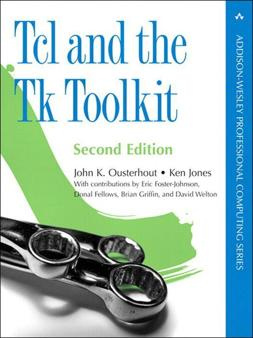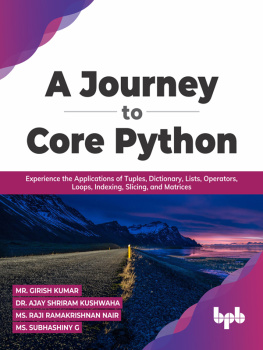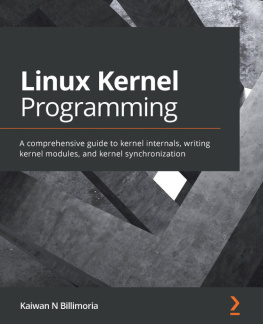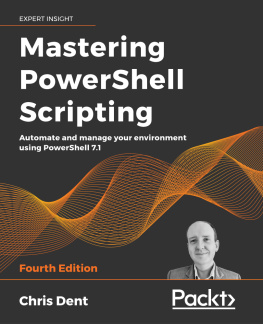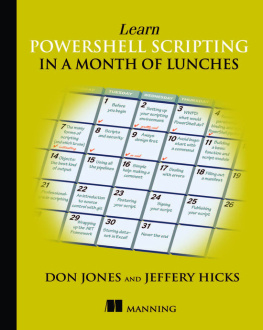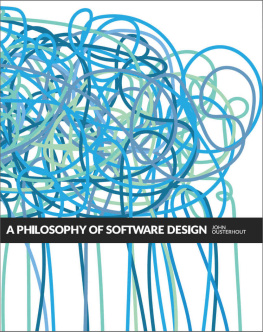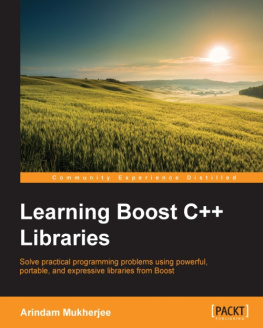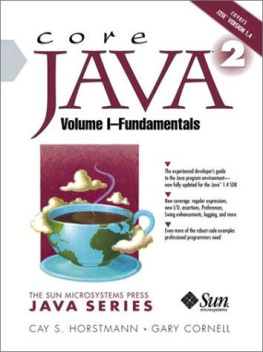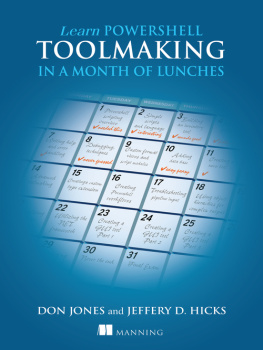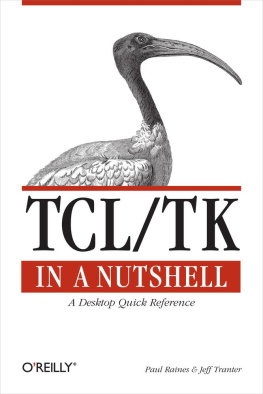
Addison-Wesley Professional Computing Series
Brian W. Kernighan, Consulting Editor
Matthew H. Austern, Generic Programming and the STL: Using and Extending the C++ Standard Template Library
David R. Butenhof, Programming with POSIXThreads
Brent Callaghan, NFS Illustrated
Tom Cargill, C++ Programming Style
William R. Cheswick/Steven M. Bellovin/Aviel D. Rubin, Firewalls and Internet Security, Second Edition: Repelling the Wily Hacker
David A. Curry, UNIXSystem Security: A Guide for Users and System Administrators
Stephen C. Dewhurst, C++ Gotchas: Avoiding Common Problems in Coding and Design
Dan Farmer/Wietse Venema, Forensic Discovery
Erich Gamma/Richard Helm/Ralph Johnson/John Vlissides, Design Patterns: Elements of Reusable Object-Oriented Software
Erich Gamma/Richard Helm/Ralph Johnson/John Vlissides, Design Patterns CD: Elements of Reusable Object-Oriented Software
Peter Haggar, Practical JavaProgramming Language Guide
David R. Hanson, C Interfaces and Implementations: Techniques for Creating Reusable Software
Mark Harrison/Michael McLennan, Effective Tcl/Tk Programming: Writing Better Programs with Tcl and Tk
Michi Henning/Steve Vinoski, Advanced CORBAProgramming with C++
Brian W. Kernighan/Rob Pike, The Practice of Programming
S. Keshav, An Engineering Approach to Computer Networking: ATM Networks, the Internet, and the Telephone Network
John Lakos, Large-Scale C++ Software Design
Scott Meyers, Effective C++ CD: 85 Specific Ways to Improve Your Programs and Designs
Scott Meyers, Effective C++, Third Edition: 55 Specific Ways to Improve Your Programs and Designs
Scott Meyers, More Effective C++: 35 New Ways to Improve Your Programs and Designs
Scott Meyers, Effective STL: 50 Specific Ways to Improve Your Use of the Standard Template Library
Robert B. Murray, C++ Strategies and Tactics
David R. Musser/Gillmer J. Derge/Atul Saini, STL Tutorial and Reference Guide, Second Edition: C++ Programming with the Standard Template Library
John K. Ousterhout, Tcl and the Tk Toolkit
Craig Partridge, Gigabit Networking
Radia Perlman, Interconnections, Second Edition: Bridges, Routers, Switches, and Internetworking Protocols
Stephen A. Rago, UNIXSystem V Network Programming
Eric S. Raymond, The Art of UNIX Programming
Marc J. Rochkind, Advanced UNIX Programming, Second Edition
Curt Schimmel, UNIXSystems for Modern Architectures: Symmetric Multiprocessing and Caching for Kernel Programmers
W. Richard Stevens, TCP/IP Illustrated, Volume 1: The Protocols
W. Richard Stevens, TCP/IP Illustrated, Volume 3: TCP for Transactions, HTTP, NNTP, and the UNIXDomain Protocols
W. Richard Stevens/Bill Fenner/Andrew M. Rudoff, UNIX Network Programming Volume 1, Third Edition: The Sockets Networking API
W. Richard Stevens/Stephen A. Rago, Advanced Programming in the UNIXEnvironment, Second Edition
W. Richard Stevens/Gary R. Wright, TCP/IP Illustrated Volumes 1-3 Boxed Set
John Viega/Gary McGraw, Building Secure Software: How to Avoid Security Problems the Right Way
Gary R. Wright/W. Richard Stevens, TCP/IP Illustrated, Volume 2: The Implementation
Ruixi Yuan/W. Timothy Strayer, Virtual Private Networks: Technologies and Solutions
Visit www.awprofessional.com/series/professionalcomputing for more information about these titles.
Tcl and the Tk Toolkit
Second Edition
John K. Ousterhout
Ken Jones
With contributions by
Eric Foster-Johnson, Donal Fellows, Brian Griffin, and David Welton

Upper Saddle River, NJ Boston Indianapolis San Francisco
New York Toronto Montreal London Munich Paris Madrid
Capetown Sydney Tokyo Singapore Mexico City
Many of the designations used by manufacturers and sellers to distinguish their products are claimed as trademarks. Where those designations appear in this book, and the publisher was aware of a trademark claim, the designations have been printed with initial capital letters or in all capitals.
Excerpts from the Tcl/Tk reference documentation are used under the terms of the Tcl/Tk license (http://www.tcl.tk/software/tcltk/license.html).
The open source icon set used in ).
The authors and publisher have taken care in the preparation of this book, but make no expressed or implied warranty of any kind and assume no responsibility for errors or omissions. No liability is assumed for incidental or consequential damages in connection with or arising out of the use of the information or programs contained herein.
The publisher offers excellent discounts on this book when ordered in quantity for bulk purchases or special sales, which may include electronic versions and/or custom covers and content particular to your business, training goals, marketing focus, and branding interests. For more information, please contact:
U.S. Corporate and Government Sales
(800) 382-3419
For sales outside the United States please contact:
International Sales
Visit us on the Web: informit.com/aw
Library of Congress Cataloging-in-Publication Data
Ousterhout, John K.
Tcl and the Tk toolkit / John Ousterhout, Ken Jones ; with contributions by
Eric Foster-Johnson... [et al.]. 2nd ed.
p. cm.
Includes index.
ISBN 978-0-321-33633-0 (pbk. : alk. paper)
1. Tcl (Computer program language) 2. Tk toolkit. I. Jones, Ken. II. Title.
QA76.73.T44O97 2009
005.13'3dc22
2009022005
Copyright 2010 Pearson Education, Inc.
All rights reserved. Printed in the United States of America. This publication is protected by copyright, and permission must be obtained from the publisher prior to any prohibited reproduction, storage in a retrieval system, or transmission in any form or by any means, electronic, mechanical, photocopying, recording, or likewise. For information regarding permissions, write to:
Pearson Education, Inc.
Rights and Contracts Department
501 Boylston Street, Suite 900
Boston, MA 02116
Fax: (617) 671-3447
ISBN-13: 978-0-321-33633-0
ISBN-10: 0-321-33633-X
Text printed in the United States on recycled paper at Edwards Brothers in Ann Arbor, Michigan.
First printing, August 2009
Contents
Preface
Tcl and Tk have evolved tremendously since John wrote the first edition of this book. In a History of Tcl that John wrote several years ago ( http://www.tcl.tk/about/history.html ), he documented several significant enhancements that occurred:
I joined Sun in May of 1994 and began building a team of Tcl developers... The additional resources provided by Sun allowed us to make major improvements to Tcl and Tk. Scott Stanton and Ray Johnson ported Tcl and Tk to Windows and the Macintosh, so that Tcl became an outstanding cross-platform development environment... Jacob Levy and Scott Stanton overhauled the I/O system and added socket support, so that Tcl could easily be used for a variety of network applications. Brian Lewis built a bytecode compiler for Tcl scripts, which provided speedups of as much as a factor of 10x. Jacob Levy implemented Safe-Tcl, a powerful security model that allows untrusted scripts to be evaluated safely. Jacob Levy and Laurent Demailly built a Tcl plugin, so that Tcl scripts can be evaluated in a web browser, and we created Jacl and TclBlend, which allow Tcl and Java to work closely together. We added many other smaller improvements, such as dynamic loading, namespaces, time and date support, binary I/O, additional file manipulation commands, and an improved font mechanism.
Next page
